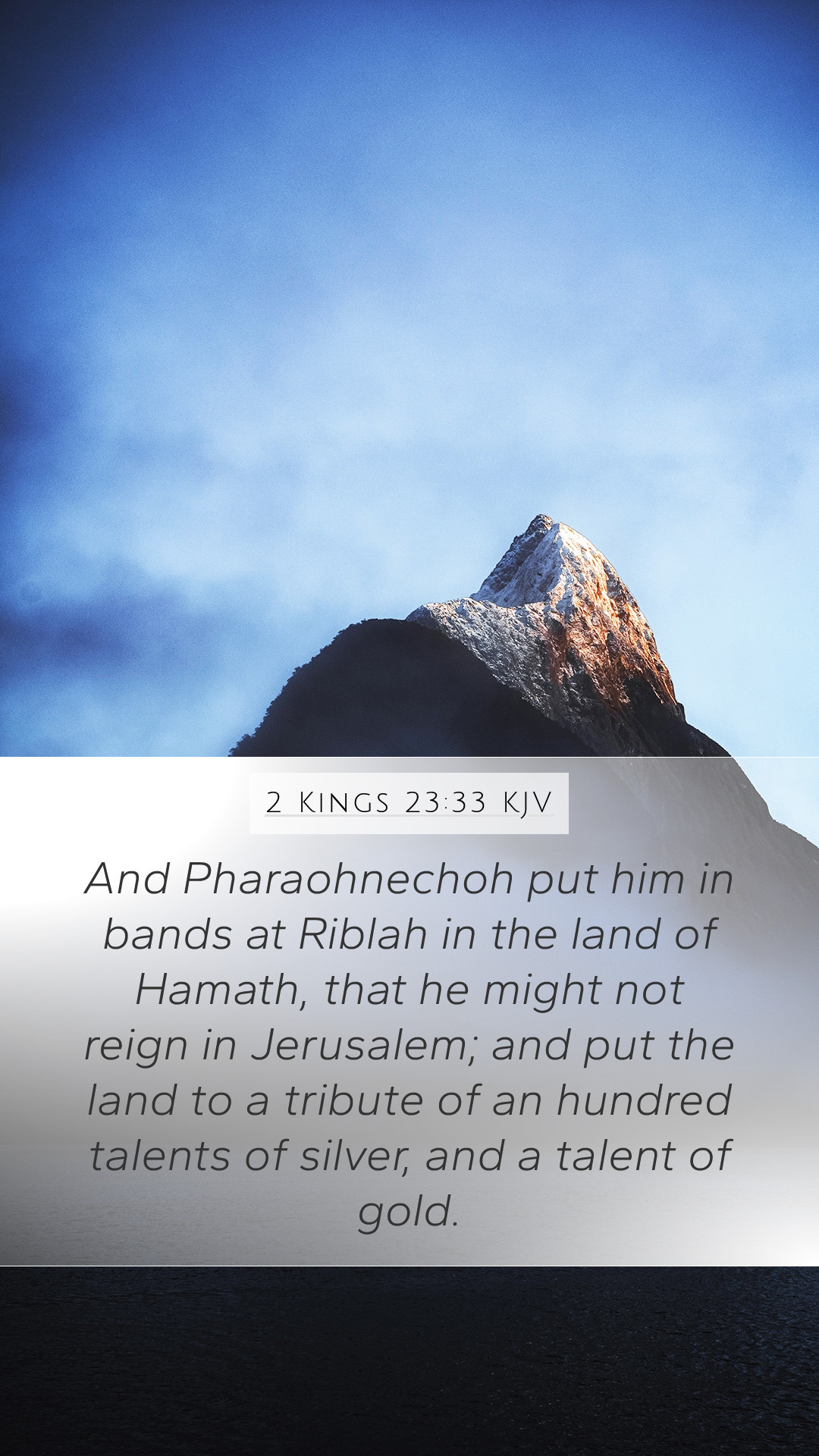Understanding 2 Kings 23:33
The Bible verse in 2 Kings 23:33 states:
"And Pharaohnecho king of Egypt put him in bands at Riblah, in the land of Hamath, that he might not reign in Jerusalem; and put the land to a tribute of an hundred talents of silver, and a talent of gold."
Summary of Biblical Context
This verse occurs during a critical time in the history of Judah. King Josiah had been killed in battle against Pharaoh Necho of Egypt, leading to his son Jehoahaz being placed on the throne. However, his reign was cut short as Pharaoh Necho captured him, illustrating the political unrest and foreign dominion over Israel during this period.
Insights from Public Domain Commentaries
-
Matthew Henry's Commentary
Matthew Henry notes that this verse signifies the control that foreign powers had over Judah following the death of Josiah. It emphasizes the decline of Egyptian influence and the beginning of the subjugation of Judah under external rulers.
-
Albert Barnes' Notes on the Bible
Barnes elaborates on the economic implications of the tribute imposed on Judah, highlighting how this tribute not only reflected their loss of autonomy but also the burdens that foreign rulers placed on them during this period of oppression. He brings attention to the hundred talents of silver and a talent of gold, interpreting this as a remarkable financial strain on the nation of Judah.
-
Adam Clarke's Commentary
Clarke adds that the name "Pharaohnecho" illustrates the power struggles of the Egyptian empire and their assertiveness in regional politics. He also discusses the implications for Judah's governance, noting that Jehoahaz's inability to reign freely marked a significant turning point in their history.
Biblical Exegesis of 2 Kings 23:33
This passage is a critical commentary on the political and economic limitations placed on Jehoahaz's kingship. The historical context is essential for understanding the implications of foreign rule and tribute on Judah's heritage.
Historical Context and Significance
The historical context of this verse reveals the chains of political turmoil that characterized the kingdom of Judah. Following King Josiah’s reforms and subsequent death, the leadership faced significant pressure, notably from external forces like Egypt. Pharaoh Necho not only captured Josiah’s son but also imposed heavy tributes, symbolizing a loss of independence for the Jewish people.
Application and Lessons
The lessons drawn from this passage are profound. It illustrates the consequences of straying from faith as seen in the failures of Judah. It serves as a reminder about the importance of strong, righteous leadership, and the impact of sin leading to external dangers and plights upon God’s people.
Cross References
- 2 Kings 24:1-4 - The continuing Babylonian dominance after this period.
- Jeremiah 22:11 - Speaking to the fate of Jehoahaz.
- 2 Chronicles 36:1-4 - Provides additional context regarding the reign and fate of Jehoahaz.
Conclusion
The verse 2 Kings 23:33 is rich in meaning, urging the reader to contemplate the themes of leadership, divine judgment, and the socioeconomic pressures of foreign rule. It highlights the significance of understanding Scripture deeply to apply its lessons effectively in daily life.
For Further Bible Study
To enhance your understanding and interpretation of Bible verses, consider resources such as Bible study groups, online Bible study tools, and guided lessons focusing on similar topics. Delving into historical contexts and symbolism greatly enriches the experience and application of biblical scriptures.


